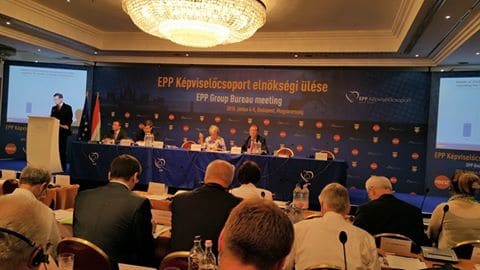Tax fairness at the European Union level is a subject that reappeared on the public agenda; the related debates are often heated, with many contradictory ideas being promoted. EPP MEPs are conscious of the need to express clear positions in European debates, including those regarding the EU´s VAT taxation system.
Is there a need for European regulations in the domain of taxation or would one need diversity and decision making at the Member State level? What is the most efficient road towards competitiveness, provided that VAT tax systems have to be equitable? These are two questions in need of viable answers.
European citizens expect tax fairness and the diminishing of this burden on SMEs, but, at the same time they want clear regulation to eliminate abuses committed by multinational companies through aggressive schemes of tax rulings as a tool of commercial negotiation.
Reconvened in Budapest, the European Parliament´s EPP Group external bureau adopted today (Thu, 4 June 2015) a draft position regarding European taxation. The EPP argues for the safeguarding of national tax sovereignty of Member States. Taxation related decisions should be taken by European governments in such a manner that these respond to the needs of competitiveness of their own economies, to assure a positive discrimination of their SMEs and to stimulate the creation of jobs.
There is again talk of tax harmonization at the Union level. Several components are pertinent here. The EPP supports tendencies of tax harmonization when considering the regulations stipulating ways to calculate the tax base. The taxes need to be paid in the country where the actual economic activity and value creation takes place. We are furthermore in favor of the harmonization of the processes of tax administration, eliminating as such the double taxation or double non-taxation of certain activities.
We categorically oppose the harmonization of tax rates. This is an area in which governments have to take decisions considering the concrete conditions from every separate Member State. In the case of Romania this position is essential, as this is coming as a support for our country´s need to keep, on the medium term, the flat tax system.The recent decision of the government to reduce the VAT for all food products from 24% to 9% is an example of the need to maintain tax rate related decision making at a national level. I am waiting with increased interest the evaluation of this decision´s effects at the end of 2016. Some analysts talk about the evaluation of the impact after 6 months of application; I would be more prudent. I believe one needs the results of an entire year in order to reach concrete conclusions.
The subject of taxation in the EU is an extremely complex and complicated matter. Many Member States from the east of Europe, such as is the case of Romania, have to immediately put an emphasis on the improvement of their tax collection capacity and effectiveness. Meanwhile, other Member States which have more permissive tax legislation, prioritize the toughening of their laws in pursuit of a more transparent regulation of aggressive tax rulings of multinational companies. The EPP is conscious of the fact that regaining of trust of the European citizens can only be done through the guarantee of true tax fairness. The people have a right to know what happens with their money, transparency being a legitimate requirement.
European taxation between competition and harmonization








